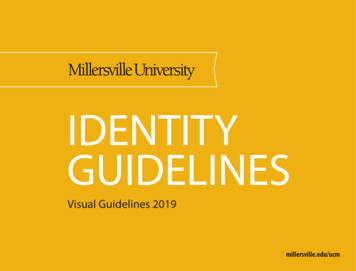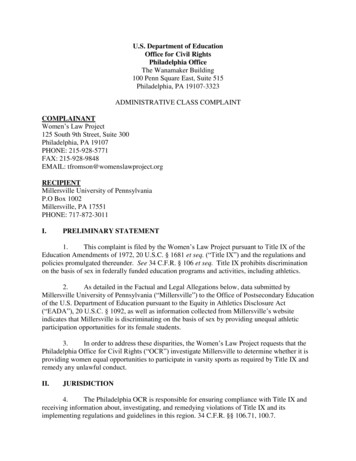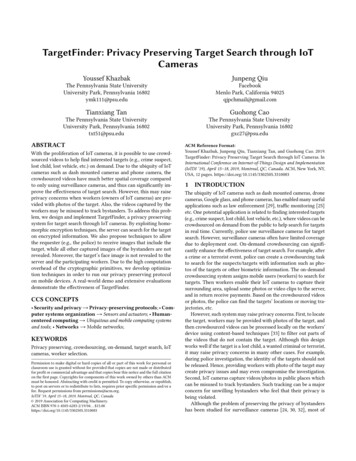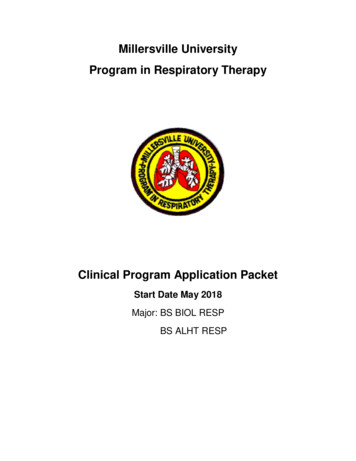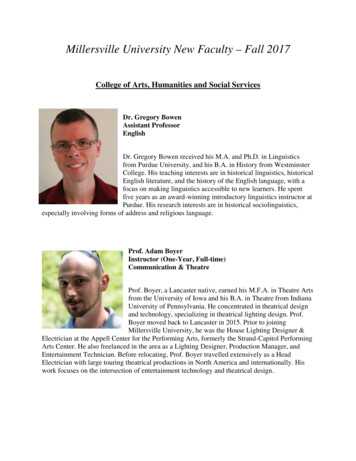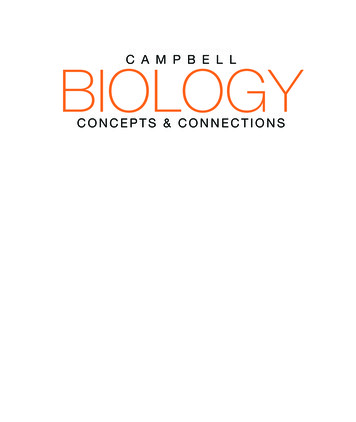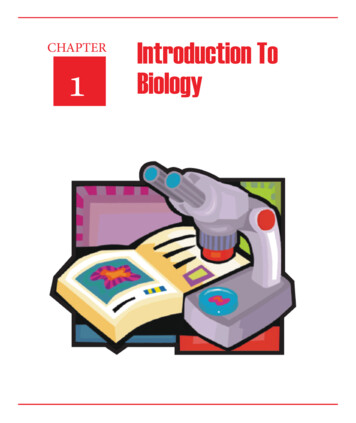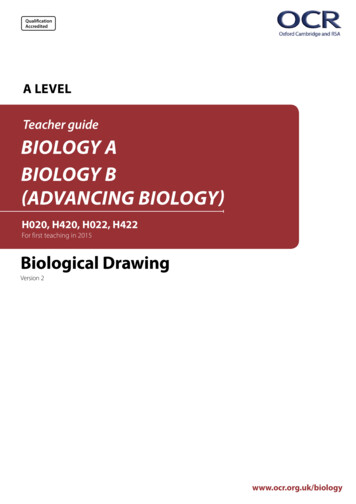
Transcription
BiologyBIOLOGYThe Department of Biology offers two degrees and 10 options leadingto the baccalaureate degree. The requirements are very similar for allprograms during the first two years, so any change in career emphasisneed not involve any major loss of time or credits. The department alsooffers minors in biology and molecular biology/biotechnology.The program leading to the Bachelor of Science degree provides thestudent with an opportunity to elect a substantial number of courses in aspecific area of biology. This program provides a strong background foradmission to graduate or professional school and prepares the studentfor employment in the field of biology upon graduation.Options available within the B.S. program include animal behavior, botany,environmental biology, marine biology, molecular biology/biotechnology,respiratory therapy, medical technology, nuclear medicine technology,premedical professions, pre-optometry, pre-athletic training and prepodiatry.The animal behavior option provides training in both the biologicalmechanisms and the evolutionary functions of behavior. Studentscompleting this option are prepared for a career in applied animalbehavior or for graduate study.Students in the botany option concentrate on the study of plants whileobtaining a broad background in biology. This option effectively preparesthose interested in professions in horticulture or plant sciences, and inadvanced graduate study in botany.The environmental biology option permits students to concentratein ecology and enables them to gain expertise that will make themcompetitive in industry, governmental agencies and graduate school.The marine biology option encourages students to choose electives inthe marine biology area. Many marine science courses are offered atour field station at Wallops Island, Virginia, since they usually involvesignificant field work. For more information on the field station, see“Chincoteague Bay Field Station at the Marine Science Consortium” inthe Special Academic Opportunities ecial-academic-opportunities/) section.The molecular biology/biotechnology option allows students toconcentrate in genetics, cell and molecular biology. The courses requiredfor this option complement each other, training students in a variety oflaboratory and methods and enabling students to gain the theoreticalunderstanding and technical expertise currently needed to be competitivein industry and graduate school.After completing three years of undergraduate study, students in themedical technology (clinical/medical laboratory science) program areeligible to apply to an accredited hospital-based medical technologyprogram for one year of clinical laboratory experience, after which theywill be awarded the Bachelor of Science degree and will be eligible tosit for the national certification examination. Currently, Millersville isaffiliated with three hospital-based medical technology (clinical/medicallaboratory science) programs.After completing three years of undergraduate study, students in thenuclear medicine technology program are eligible to apply for admissionto one of the member hospitals of the Pennsylvania College of HealthSciences of Nuclear Medicine Technology for one year of hospital1training, after which they will be awarded the Bachelor of Science degreeand will be eligible to sit for the national certification examination.An agreement between Millersville University and Salus University(formerly the Pennsylvania College of Optometry) in Philadelphiaallows students in the optometry option to complete three years ofundergraduate study at Millersville and then transfer to Philadelphia forthe first year of study in the doctoral program. Students who completethe year with good grades receive a B.S. in biology from MillersvilleUniversity, and after three additional years earn the Doctor of Optometrydegree.A cooperative option exists between Millersville University and theTemple University School of Podiatric Medicine. This 3/4 prepodiatryprogram allows students to transfer to the professional school aftersatisfactorily completing 99 semester hours at Millersville University.After successful completion of the basic science courses at the TempleUniversity School of Podiatric Medicine, students are awarded a B.S.in biology from Millersville University. Three recommended Millersvillestudents a year have reserved spaces for admission to the podiatriccollege, where graduation after four years earns a D.P.M. degree.Millersville University has recently entered into an Early AcceptanceProgram (EAP) agreement with the Lake Erie College of OsteopathicMedicine (LECOM) for programs in osteopathic medicine, dentistryand pharmacy. The current agreement is a “4 4 year program” and isdesigned for incoming first year students and second-year students.Students who are interested in the EAP must be accepted by LECOM,either as an incoming first year student, or before completing theirsophomore year, and complete their degree at Millersville University. (EAPstudents will need to take the MCAT and complete an online applicationbefore they can enroll at LECOM.) Accepted students must do well duringeach academic semester at Millersville but will have a guaranteed seat inthe classroom at LECOM.Millersville University is the sponsoring institution for the respiratorytherapy program. After successfully completing three years of study atthe University, students enter the 16-month clinical phase at UPMC Lititz.Admission into the clinical phase is competitive and not guaranteed. Atthe end of the clinical phase, they are awarded the Bachelor of Sciencedegree and a certificate in respiratory therapy, and will be eligible to sit forthe national credentialing examination.The education curriculum leads to the Bachelor of Science in Education,with secondary education certification in biology.Individualized programs in pre-medicine, pre-dental, pre-optometry, prepodiatry and pre-veterinary medicine are organized with the programadvisor.Bachelor of Science in Allied Health TechnologyThe Department of Biology offers one degree and five options leading tothe baccalaureate degree in allied health technology. The requirementsare initially very similar for each of the options so that any change incareer emphasis need not involve any major loss of time or credits.A dual-degree program in athletic training is available for well-preparedstudents. During three years of study at Millersville, students completethe requirements for admission to an affiliated graduate program.Upon completion of one year of graduate study, credits transfer back toMillersville to satisfy the requirements for the B.S. degree in allied healthtechnology, pre-athletic training. Students then earn a M.S. in athletic
2Biologytraining from the affiliated university after a second year of graduatestudy.A four-year program prepares students for graduate or professionalstudies to become specialists in sports medicine, such as athletictrainers, physical therapists, physicians and physician assistants. Thecurriculum includes courses in nutrition, sports psychology, and theprevention and care of injuries.After completing three years of undergraduate study, students in theallied health technology/medical technology program are eligible to applyto an accredited hospital-based medical technology program for oneyear of clinical laboratory experience, after which they will be awardedthe Bachelor of Science degree and will be eligible to sit for the nationalcertification examination. Currently, Millersville University is affiliatedwith three hospital-based medical technology (clinical/medical laboratoryscience) programs.After completing three years of undergraduate study, students in theallied health technology/nuclear medicine technology program areeligible to apply for admission to one of the member hospitals of thePennsylvania College of Health Sciences for one year of hospital training,after which they will be awarded the Bachelor of Science degree and willbe eligible to sit for the national certification examination.Millersville University is the sponsoring institution for the respiratorytherapy program. After successfully completing two years of study atthe University, students enter the approximately two-year clinical phaseat UPMC Lititz. Admission into the clinical phase is competitive andnot guaranteed. At the end of the clinical phase, students are awardedthe Bachelor of Science degree and a certificate in respiratory therapy,and will be eligible to sit for the national credentialing examination. Thisdegree option differs from the other B.S. allied health technology and B.S.degree programs offered by the biology department in its format and istermed a “2 2 year program” that begins the clinical year in the summerfollowing the sophomore year, not the end of the junior year, as is thecase for the other degree options.the programs Allied Health Technology, B.S. - Pre-Athletic Training Dual-DegreeOption ) Allied Health Technology, B.S. - Respiratory Therapy 2 2 YearOption nology-bs-respiratorytherapy-2-2-year-option/) Allied Health Technology, B.S. - Medical Technology 3 1 YearOption nology-bs-medicaltechnology-3-1-year-option/) Allied Health Technology, B.S. - Nuclear Medicine Technology 3 1Year Option on/) Allied Health Technology, B.S. - Sports Medicine hnology-bs-sports-medicine/) Biology Minor llege-science-technology/biology/biology-minor/) Biology, B.S. llegescience-technology/biology/biology-bs/) Biology, B.S. - Environmental Biology Option nmental-biology-option/) Biology, B.S. - Respiratory Therapy Option atory-therapy-option/) Biology, B.S. - Animal Behavior Option -behavior-option/) Biology, B.S. - Marine Biology Option biology-option/) Biology, B.S. - Medical Technology Option l-technology-option/) Biology, B.S. - Molecular Biology/Biotechnology Option lar-biology-biotechnology-option/) Biology, B.S. - Nuclear Medicine Technology Option r-medicine-technology-option/) Biology, B.S. - Optometry Option ry-option/) Biology, B.S. - Plant Sciences Option ciences-option/) Biology, B.S. - Pre-Medical Professions Option dical-professions-option/) Biology, B.S. - Pre-Podiatry Option iatry-option/) Biology, B.S.Ed. llege-science-technology/biology/biology-bsed/) Molecular Biology/Biotechnology Minor biotechnology-minor/)the facultyCebra-Thomas Judith; Associate ProfessorCollege of Science and TechnologyB.A., Johns Hopkins University, 1979; Ph.D., Washington University, 1986Didier Dominique; ProfessorCollege of Science and TechnologyB.A., Illinois Wesleyan University, 1987; Ph.D., University ofMassachusetts, 1992Fellmeth Jessica; Assistant ProfessorCollege of Science and TechnologyB.A., The College of New Jersey, 2006; Ph.D., Rutgers the State Universityof New Jersey, 2015Haines Aaron; Associate ProfessorCollege of Science and Technology
BiologyB.S., Virginia Tech, 1998; M.S., Texas A&M University, 2003; Ph.D., Ibid.,2006Hardy Christopher R.; ProfessorCollege of Science and TechnologyA.A., Catonsville Community College, 1991; B.S., University of Maryland,1995; Ph.D., Cornell University and New York Botanical Garden, 2001Hoover John E.; ProfessorCollege of Science and TechnologyB.S., Indiana University of Pennsylvania, 1985; Ph.D., SUNY at Syracuse,1990Horton Brent; Associate ProfessorCollege of Science and TechnologyB.S., Warner College of Natural Resources, 1999; Ph.D., University ofMaine, 2007Klosinska Maja; Assistant ProfessorCollege of Science and TechnologyM.S., University of Lodz (Poland), 2003; M.S., Ibid., 2004; Ph.D., PrincetonUniversity, 2011Lehman Heather; Assistant ProfessorCollege of Science and TechnologyB.S., Shippensburg University, 2004; Ph.D., University of Delaware, 2012Ligocki Isaac; Assistant ProfessorCollege of Science and TechnologyB.A., Wittenberg University, 2006; Ph.D., The Ohio State University, 2015Ramos-Sepulveda Laura; Assistant ProfessorCollege of Science and TechnologyB.A., University of Puerto Rico at Mayaguez, 2010; Ph.D., ThePennsylvania State University, 2014Ryndock Eric; Assistant ProfessorCollege of Science and TechnologyB.S., Millersville University, 2007; Ph.D., The Pennsylvania StateUniversity, College of Medicine, 2016Stieha Christopher; Assistant ProfessorCollege of Science and TechnologyB.S., University of Kentucky, 2003; B.A., Ibid., 2003; M.S., Ibid., 2008; Ph.D,Ibid., 2012Stoltzfus Jonathan; Assistant ProfessorCollege of Science and TechnologyB.S., Messiah College, 1008; Ph.D., University of Pennsylvania PerelmanSchool of Medicine, 2015Wagner Ryan; Associate ProfessorCollege of Science and TechnologyB.S., South Dakota State University, 1996; Ph.D., Washington StateUniversity, 2001Wallace John; ProfessorCollege of Science and TechnologyB.S., The Pennsylvania State University, 1983; M.S., ShippensburgUniversity, 1990; Ph.D., Michigan State University, 1997Weaver Carolyn; Assistant ProfessorCollege of Science and TechnologyB.S., Texas A&M University at Galveston, 2003; Ph.D., Ibid., 2016Weise Cross Laura; Assistant Professor3College of Science and TechnologyB.A., University of Texas, 2009; B.S., Ibid., 2009; Ph.D., University of NorthCarolina, 2015the coursesBIOL 100: 3 s.h.General Biology (G2)An introduction to biology with emphasis on cell structure, metabolism,genetics, behavior, ecology, adaptations, organ systems and evolution. 2hours lec., 2 hours lab. No credit toward BIOL major.BIOL 101: 4 s.h.Foundations of Biology (G2)This introduction of biological principles provides the foundation ofmodern biological knowledge essential for all higher-level courses.Topics include cell structure and function, cellular reproduction, energyacquisition, biochemical pathways, mechanisms of inheritance, naturalselection, speciation and evolution. 2 hrs. lec., 1 hr. discussion, 3 hrs.lab. Offered in fall, spring. Prereq: Biology major or biology minor orpermission of instructor.BIOL 108H: 1 s.h.Hnrs:Freshman Biology SeminarEmphasis on the intellectual and historical context of the core ideasof BIOL 100 and an in-depth exploration of ideas raised in lecture andlabora tory. Satisfies the honors lab when taken with Biology 100. 1 hr.seminar. Offered in fall, spring. Prereq or coreq: BIOL 100 or 101.BIOL 140: 4 s.h.Introductory Ecology (G2)Introductory course in ecology (interactions of living organisms withthe environment), evolution (adaptations of living organisms to theenvironment), and the environment of life on planet earth. Importantapplied ecological topics such as agriculture and forestry, exploitation ofpopulations, effects of disturbance and climate change, and conservationof biological diversity also are examined. The course covers significantcontent of the Academic Standards for Environment and Ecology andthe Middle Level Science Competencies as required by the Pa. Dept. ofEducation. 3 hrs. lec., 3 hrs. lab. No credit toward BIOL major. Prereq:ENGL 110, COMM 100 and completion of one course of MATH in college;acceptable courses include MATH 101, MATH 104 or higher. In addition,BIOL 100 or BIOL 101 is recommended.BIOL 179: 3 s.h.ExperimentalExperimentalBIOL 204: 3 s.h.Human Biology (G2, W)A non-laboratory course in human biology designed specifically for thosestudents planning to specialize in social work, psychology or relatedfields. An overview of the changes that take place in the course of ahuman lifetime; basics of human evolution, ecology, behavior, anatomyand physiology of the human organism are discussed. 3 hrs. lec. Offeredfall, spring. Prereq: BIOL 100 or BIOL 101, or permission of instructor, andENGL 110. No credit toward BIOL major.BIOL 205: 3 s.h.Heredity and Human Affairs (G2)Genetics for non-majors with reference to human heredity anddevelopment. The social implications of recent advances in genetics areconsidered. 3 hrs. lec. Offered periodically. Prereq: BIOL 100 or BIOL 101,or permission of instructor or RN, and MATH 1**. No credit toward BIOLmajor.
4BiologyBIOL 207: 3 s.h.Human Sexuality (D, G2, W)Study of the nature of human sexuality, particularly as it relates tobiological phenomena. Discussions and films will cover the biologyof human reproduction, biology of human sexual behavior and itsimplications. 3 hrs. lec. Offered periodically. Prereq: BIOL 100 or BIOL 101,or permission of instructor or RN, and ENGL 110. No credit toward BIOLmajor.BIOL 241: 3 s.h.Principles of EcologyEcological principles underlying physiological adaptations of organismsto their environment, population dynamics, community analysis andecosystem studies. Ecological and evolutionary theory emphasized withexamples from aquatic and terrestrial habitats. 3 hrs. lec. Offered in fall,spring. Prereq: BIOL 100 or BIOL 101 and MATH 235, 151, 160 or 161. Nocredit toward BIOL major.BIOL 208: 3 s.h.Plants and People (G2)Explores uses of plants and plant products by man and their impact onthe development of civilization. Characteristics of plants that make themsuitable for food, shelter, clothing, energy, medicines, entertainment,objects of worship, microclimate modification and aesthetic objects arediscussed. 3 hrs. lec. Offered periodically. Prereq: BIOL 100 or BIOL 101,or permission of instructor. No credit toward BIOL major.BIOL 254: 4 s.h.Human Anatomy & Physiology IStudy of the structure and function of the human body. This firstsemester of a two-semester sequence deals with the development,histology, gross anatomy, function and pathophysiology of the cutaneous,skeletal, muscular and nervous systems. 3 hrs. lec., 3 hrs. lab. Offered infall. Prereq: BIOL 100 or BIOL 101.BIOL 211: 4 s.h.Concepts of Zoology (G2)Study of invertebrate and vertebrate animals. Classification, reproduction,development, ecology, physiology, behavior, genetics, scientificmethodology (including simple statistical approaches), and evolution.Laboratory studies include microscopy, dissections, live observations,computer exercises and experimentation. 3 hrs. lec., 3 hrs. lab. Prereq:BIOL 101 or BIOL 100 with a grade of C- or higher for non-majors; B- orhigher in BIOL 100 for biology majors.BIOL 212H: 1 s.h.Hnrs:Zoology SeminarContinuation of BIOL 211. Original investigations and/or readings anddiscussions of the zoological literature about the diverse adaptationsof animals to their environments. Completion of both BIOL/HNRS 212and BIOL 211 earns 5 credits to be counted as one course in the G2block. BIOL/HNRS 212 may not be used independently to fulfill a G2requirement. 1 hr. seminar. Offered periodically. Prereq: completion ofBIOL 211 with a grade of B- or higher and member of University HonorsCollege, or 3.35 GPA, or instructor’s permission.BIOL 221: 4 s.h.Concepts of Botany (G2)Consideration of features unique to plants such as localized meristemsand open growth, water relations, photosynthesis, cell structure. Anintegrated study of plant structure and function using angiospermsas principal examples. Includes brief discussions of plant and fungaldiversity, plant ecology and evolution and economic botany. 3 hrs. lec., 3hrs. lab. Prereq: BIOL 101 or BIOL 100 with a grade of C- or higher; B- orhigher in BIOL 100 for biology majors.BIOL 222H: 1 s.h.Hnrs:Problem Solving In BotanyA botanical science investigation of a problem or series of problems.Students define a problem with a botanical basis, search appropriateliterature, formulate hypotheses and collect appropriate informationto test hypotheses through experimentation and data gathering.Completion of both BIOL/ HNRS 222 and BIOL 221 earns 5 credits tobe counted as one course in the G2 block. BIOL/HNRS 222 may not beused independently to fulfill a G2 requirement. 1 hr. seminar. Offeredperiodically. Prereq: completion of BIOL 221 with a grade of B- or higherand member University Honors College, or 3.35 GPA, or instructor’spermission.BIOL 255: 4 s.h.Human Anatomy & Physiology IIStudy of the structure and function of the human body. This secondsemester of a two-semester sequence deals with the development,histology, gross anatomy, function and pathophysiology of the endocrine,circulatory, respiratory, digestive, urinary, and reproductive systems. 3 hrs.lec., 3 hrs. lab. Offered in spring. Prereq: BIOL 254.BIOL 255H: 4 s.h.Hon: Human Anat/Phys 2BIOL 256: 3 s.h.Nutrition (G2, W)Principles of adequate nutrition including digestion and metabolism offoods; energy, protein, mineral and vitamin needs; environmental andindustrial contaminants, additives and carcinogens; dietary treatment fornutritional disorders. 3 hrs. lec. Offered in fall, spring. Prereq: BIOL 100and ENGL 110. No credit toward BIOL major or minor. No credit given ifcredit earned for BIOL 352 or WSSD 452.BIOL 257: 1 s.h.Introduction to Allied Health ProfessionsA survey of the various disciplines in the allied health field. The coursedescribes the type of training offered by hospitals for students whoare planning to major in a health profession and for students who areundecided on a career. 1 hr. lec. Offered in fall.BIOL 266H: 1 s.h.Hnrs:Adv Princ Cell BiologyCellular operations and processes: hormonal control of cell physiology,secretory activities and vesicular trafficking, control of cell division,neu rotransmission, control of muscle contraction, signal transduction,interrupted genes, cell recognition, etc. Students explore and leaddiscussions on one of these topics. Completion of both BIOL/HNRS266 and BIOL 263 earns 5 credits to be counted as one course in theG2 block. BIOL/ HNRS 266 may not be used independently to fulfill aG2 requirement. 1 hr. seminar. Offered periodically. Prereq: completionof BIOL 362 or BIOL 263 with a grade of B- or higher and member ofUniversity Honors College, or 3.35 GPA, or instructor’s permission.BIOL 281: 3 s.h.Behavioral Biology (G2, W)Provides an evolutionary and ethological frame of reference for furtherstudies in psychology and animal behavior. Lectures supplemented bydemonstrations and A-V media cover animal diversity, nervous systems,sensory reception, communication and behavior. 3 hrs. lec. Offered in fallor spring. Prereq: BIOL 100 or BIOL 101, and ENGL 110. No credit towardBIOL major.
BiologyBIOL 290: 3 s.h.Coastal Marine BiologyIntroduction to marine organisms, marine communities, and the physical,chemical, and biological parameters that shape them; laboratory and fieldwork will emphasize local coastal marine ecosystems. 2 hrs. lee., 3 hrs.lab. Offered in summer at the Chincoteague Bay Field Station. Prereq:BIOL 211 or 1 year of college biology or permission of instructor. No creditgiven If credit earned for BIOL 291.BIOL 291: 4 s.h.Marine Biology (G2)Phylogeny, morphology and ecology of marine organisms. Similaritiesand differences in solutions to problems of life in the marine environmentare stressed. 2 hrs. lec., 3 hrs. lab. Weekend field trips. Offered in fall.Prereq: C- or higher in BIOL 211.BIOL 292: 1 s.h.Problem Solving in Marine BiolAn introduction to foundational topics within marine biology, Including (1)quantitative reasoning for aquatic biologists, (2) marine geography andmapping, (3) life in a fluid environment, (4) microcosms: marine aquariumsystems, (5) scientific Illustration, (6) electronic resources In marinebiology, (7) Internships, coops, jobs, and careers in marine biology, and(8) current topics. Offered In summer. Prereq: placement in college-levelmathematics or permission of instructor. No credit given if credit earnedfor BIOL 291.BIOL 293: 3 s.h.Coastal OrnithologyStudents will achieve a strong understanding of a variety of aspectsin ornithology with the strongest focus on field techniques, includingidentification. Material covered will include evolution, anatomy,physiology, behavior and ecology. A portion of the course will include anoverview of the avian families of North America, especially those foundin coastal regions along the mid-Atlantic seaboard. The field componentfor this course will include mist netting, census techniques and fieldidentification. Emphasis will be placed on field research and a portionof the course will involve the development of a novel research idea inornithology.BIOL 294: 3 s.h.Coral Reef EcologyThe focus of this course is to introduce students to the unique aspectsof coral reefs, and to provide a working knowledge of reef species andreef ecology. Students will learn basic taxonomy, biology, ecology, andconservation of coral reefs and the organisms associated with thishabitat. Laboratory will consist of hands-on field experiences in a coralreef habitat. Students will learn techniques for study and assessment ofmarine habitats and complete an independent project.BIOL 295: 3 s.h.Marine InvertebratesThe invertebrate phyla with emphasis on development, reproduction,structure, function and classification of selected marine organisms.Laboratory and field experience in collection, preservation andclassification of the phyla.BIOL 296: 3 s.h.Marine EcologyInterrelationships among animals, plants and physical and chemicalaspects of the environment will be studied, with stress on adaptations forsurvival that are unique to the marine environment.BIOL 300: 3-12 s.h.Co-Op Ed Experience in BiolCo-Op Ed Experience in Biol5BIOL 318: 4 s.h.Comparative Vertbrate AnatomyFunctional and comparative anatomy of selected vertebrates withdevelopmental and evolutionary perspectives. Lab will primarily consistof dissection and histological analyses of animals representing variousvertebrate classes. Comparisons between animals at the same level, andto see diverse features superimposed upon a common pattern. 3 hrs. lec.,3 hrs. lab. Offered in spring, 2 of 3 years. Prereq: BIOL 211 and BIOL 362or 263, or permission of instructor.BIOL 324: 4 s.h.Plant BiochemistryA study of enzymes and pathways involved in plant intermediary asrelated to plant cell structure, function and plant development. Topicsinclude plant bioenergetics, biosynthesis of plant hormones andelicitor molecules, signal perception and transduction, and secondarymetabolites (natural products). 3 hrs. lec., 3 hrs. lab. Offered in spring.Prereq: BIOL 221 and BIOL 362 or BIOL 263, CHEM 232 or CHEM 235.BIOL 325: 3 s.h.Plant SystematicsA survey of local vascular flora, use of dichotomous keys in identifyingplants, distinguishing features of common plant families, principlesof plant systematics. Phylogenetic, biosystematic and nomenclaturalconcepts are considered. 2 hrs. lec., 3 hrs. lab. Offered in fall. Prereq: C- orhigher in BIOL 221.BIOL 327: 3 s.h.Horticultural SciencePrinciples of horticultural science including regulation of plant growth,propagation and breeding, plant nutrition, pruning, plant diseases andspecial topics related to individual types of plants. Laboratory includespropagation and handling of plants in the greenhouse and field trips. 2hrs. lec., 3 hrs. lab. Offered in spring. Prereq: BIOL 221 or permission ofinstructor.BIOL 327H: 3 s.h.Hon: Horticultural ScienceBIOL 329: 3 s.h.Plant-Insect InteractionsThe chemical and biological interactions between plants and insectswill be extensively examined with particular emphasis on the chemicalecology of important behaviors such as herbivory, oviposition, andpollination. The chemical communications between plants and insectswill be examined regarding how plant-produced chemicals influence, bothdirectly and indirectly, the behaviors of insects. Chemical, anatomical,behavioral, environmental and evolutionary concepts linked to plantinsect interactions will be examined. Unique laboratory experienceswill include the design and implementation of an independent researchproject and the rearing of Lepidoptera to establish research colonies. 2hrs. lec., 3 hrs. lab. Prereq: BIOL 221, BIOL 211, and either CHEM 231 orCHEM 235 or permission of the instructor.BIOL 340: 3 s.h.Prspctv in Environm Awareness (P)Interdisciplinary study of current environmental problems and theirimplications on future habitability of the planet. Physical, biological andsocial aspects of alterations to ecosystems presented and solutionsconsidered. Course includes lectures, open forums and studentpart
admission to graduate or professional school and prepares the student for employment in the field of biology upon graduation. Options available within the B.S. program include animal behavior, botany, environmental biology, marine biology, molecular biology/biotechnology, respiratory therapy, medical technology, nuclear medicine technology,

